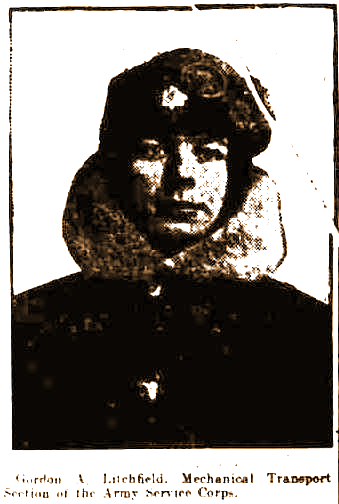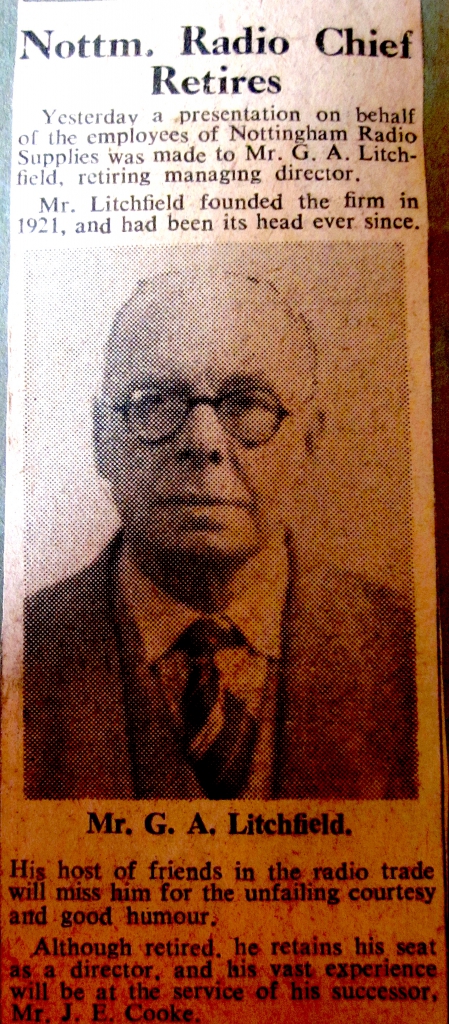GORDON ARTHUR LITCHFIELD 1890–1973
Nottm Journal 30 January 1915
Born 29th December 1890 in Northampton. Birth register Arthur Gordon
Married on 25th July 1918 at St Mary’s Church, Radcliffe to Marie Stephanie Nachez, age 22, from Radcliffe on Trent
Died in March 1973 in Chesterfield District, cremated and ashes interred Radcliffe Cemetery (X95, headstone)
1891 Census
Living at 73 Turner Street, St Giles, Northampton with father Arthur 24, a builder and joiner and mother Elizabeth 22, boarder Robert Thurston, journeyman painter and domestic servant Kate Walters.
1901 Census
Age 10 living at 83 Colwick Road, Nottingham, with father Arthur, joiner and builder, mother Elizabeth, brother Lancelot Albert 6, and an adopted daughter L Thurston 14 a dressmaker.
1911 Census
Age 20, employed as a bricklayer, living with parents at 6 Dale St, Sneinton, Nottingham, brother Lancelot, joiner, and a servant Kathleen Thacker.
Military Service
Rank: Company Quarter Master Sergeant
Military Unit: Royal Army Service Corps (Records Office Bournemouth)
Service Number: M1/7183
Theatre of War: France and Flanders, date of entry 21.10.14.
Gordon Litchfield gave the following account of his war service to the Nottingham Daily Express in January 1915:
From the Nottingham Daily Express, 30th January 1915
WITH A MOTOR CAR AT THE FRONT
Nottingham Transport Driver Tells of Trying Times with No Lights on Dark Roads.
Mr. Gordon A. Litchfield, whose photograph we give is one of the first batch of Nottingham men who enlisted in the Mechanical Transport Section of the Army Service Corps, He is well known in local scout and musical circles, for prior to joining the Colours he was master of the Sneinton troop of Baden-Powell Boy Scouts for some years while, possessing a fine baritone voice, he has frequently appeared on local concert platforms.
The elder son of Mr. A. B. Litchfield, of Dale-street, Sneinton, he enlisted as a Mechanical Transport driver at Grove Park, London, on October 21st, and within a fortnight he was sent to the Continent on active service.
The photograph shows him clad in his fur-lined greatcoat and “ear” cap, just as he returned from duty on the battlefields, from which he brings interesting stories and experiences.
“We left London for Avonmouth on November 2nd,” Mr. Litchfield told a representative of the “Nottingham Daily Express” yesterday, (29th January 1915) and boarding a cattle boat, were sent across to Boulogne. Since then I have done everything from cooking for my comrades to taking out officers and ammunition to the firing line and fetching in wounded. The longest period I was under fire was eight days at Bethune”.
“What is the sensation of being under fire”? “Oh, it sends a funny feeling down your back”. He shivered reminiscently.
“I shall not forget my first experience. It was a pitch dark night – all movements are carried out under cover of darkness. I had taken up an officer at about 10.30 or eleven o’clock, and after the officer had left me to go into the lines, I heard the bullets hitting the trees close by. Then I saw and heard the shells bursting, perhaps a quarter of a mile away. I had not been there long before I thought it time to look for shelter, and, luckily, close to, there was a farmhouse. The place had been knocked to bits by shells, and I was able to back the car though a big hole in the wall into one of the rooms of the house.
I had just got fixed up for the night, when I heard something shuffling about inside, I slipped five cartridges into my rifle – I should tell you that all drivers are armed with a kind of light rifle or carbine – and waited. Then the form of a man appeared, and I challenged him, but he turned out to be an English interpreter, and I was pleased to have his company. It was a miserable place. While we were talking I heard another shuffle, and two forms came creeping along the crowd. I again took up my rifle, but a voice called out: “It’s all right, mate.” They were a couple of English ‘Tommies.’ One had been wounded on the ankle by shrapnel, and the other had crawled with him on his back from the trenches. I put the wounded man into the car, and gave him a loaf and a little tin of jam. He finished them before the night was out.
That night we got wet to the skin. It rained in torrents. I have been drenched time after time since then, but I have not had even a slight cold. Motor driving out there is very exciting work. There are no lights on the roads and no lights on the cars. The roads are only metalled in the centre, and one either side there is a foot of thick mud, I saw scores; omnibuses, and transport wagons which had overturned on the sides of the roads. They are to be left there until they can be got up. Sometimes I have had to ride on the front mudguard, and give directions while an officer has driven the car. But it’s good sport, and every man who can drive a car should go. I slept in a pig-sty one night at Bethune. That was a ‘great night.’ Rain was falling heavily, and I had to get shelter of some kind. I climbed into a pig-sty at one of the farms, and then up on to some straw above the pigs. What with the grunting of the pigs and the rain falling like the very dickens, well – I tell you it was a great night.
The countryside in the entrenched districts is absolutely desolate. The houses are smashed to bits in some places, and you see big farm buildings with great holes in them. Just now I suppose it looks very bad, because the trees have no leaves and the roads and fields have been cut up by the traffic”.
A GURKHA FRIGHT
Startling Experience
“The most startling experience I had was with a Gurkha. I had taken up an officer to the entrenchments, and he as just about to leave me, when we heard something coming. The officer turned round sharply and called to me: ‘Look there!’ It was a Gurkha stealing along the hedge-side towards us on his hands and knees. He had his knife in his mouth, and he was not the sort of being you would care to meet on a dark night. He smiled when he saw we were English, but he startled me, and the stories our fellows tell about the Gurkhas out there make your shudder”.
Mr. Litchfield had seen Commander Sampson at work on his armoured car, while other experiences which have befallen him were the collection of the wounded from the base hospitals. A motor transport man had to drive all kinds of cars, but the task was far from unpleasant.
“Our ‘Tommies, he said, enjoy themselves in the trenches. They have gramophones and are well clothed; and they have plenty to eat. I should imagine they practically keep the poor people in the entrenched districts. Everybody out there seem to have lost every penny they had; and our soldiers give them all the food they can spare. The food we get is really splendid, and there is no complaint to be heard anywhere in regard to that. In the districts which the soldiers call ‘up country,’ the people will do anything for you. One of our fellows, I must tell you, could not get shelter one night, so he broke open a cafe and made himself very comfortable. The soldiers in the trenches seem to me to be happier than those at the bases. I have not heard a bit of music at the bases, and there is only one piano that I know of in Boulogne. It is in the Y.M.C.A. tent. I want to get together a few mouth organs and concertinas for the soldiers at the bases, and if anybody will send me some I would be glad.”
Mr. Litchfield was at home on seven days’ leave, and returned to Boulogne on Thursday. 4th February 1915.
Medals Awarded: 1914 Star, British War and Victory
Military Personnel Address on 1918 Electoral Roll:
The Lodge, Wharfe Road, Radcliffe on Trent
1921 Census
Address: Shelford Road, Radcliffe
Employment: House Builder
Household: wife Marie
1922 Electoral Register
Address: Shelford Road, Radcliffe on Trent
1939 Register
Address: La Chaumiere, Cropwell Road, Radcliffe on Trent
Occupation: Managing Director, radio and electrical equipment
Other information
Directories: British War Phone books 1940: living at 49 Cropwell Road, Radcliffe on Trent,
Kelly’s Directory 1941: Listed as a Private Resident living at La Chaumiere, Cropwell Road, Radcliffe on Trent
Reason for inclusion on the Radcliffe on Trent Roll of Honour
Lived in Radcliffe on Trent during the war and is buried in Radcliffe on Trent cemetery.


